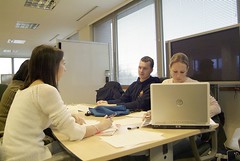 A while back, I opened a staff development institute for a school district someplace in New England. I delivered my contemporary literacy thing where I uncover Nazi conspiracies, built maps of the world with tabular data, construct historic tag clouds, and showcase amazingly inspiring student video productions. It’s a great magic and I confess some thrill in performing it. I’m old enough to remember when it would have been magic.
A while back, I opened a staff development institute for a school district someplace in New England. I delivered my contemporary literacy thing where I uncover Nazi conspiracies, built maps of the world with tabular data, construct historic tag clouds, and showcase amazingly inspiring student video productions. It’s a great magic and I confess some thrill in performing it. I’m old enough to remember when it would have been magic.
But on this particular day, the district’s assistant superintendent for instruction got up after my talk to dismiss the faculty for the dozen’s of breakout sessions available to them. But before he did, he said, “I know now how illiterate I am.” It wasn’t the first time I’ve heard that, and in itself it indicates a reflection about his own information skills. But he didn’t say, “I’m going to learn how to do some of these things, because they are important.”
I’m afraid that there may have been educators in the audience, seasoned and new, who were looking for an excuse not to pursue contemporary literacy skills, and he may have given it to them. The fact is that learning to work digital content to accomplish goals is not hard to do, and you don’t have to learn to do all of it. There is always someone nearby who can show you, and there are always your students. Give them the chance to see you as a master learner — a life-long learner.
It isn’t something that can be solved with workshops or lesson plans. They aren’t skills that must be learned, and then “problem solved.” Learning it is easy. Being in the habit of learning and using it is hard.
It can start simply. Make it your practice to add something new to every lesson that you teach. It doesn’t have to be digital and it doesn’t have to involve your students touching technology.
But it has to be something that you learned by teaching yourself — by utilizing learning literacy skills.
Image Citation:
“Learning Grid University of Warwick.” Jisc_Infonet’s Photostream. 15 May 2006. 15 Feb 2008 <http://flickr.com/photos/jiscinfonet/146842296/>.

I totally understand your frustration. I have a similar response to one of the key members of the learning technology community here in the UK, who regularly chairs seminars and such like. He prefaces his introductions with words like “I tend to be a bit agnostic about this… ” or “I’m not convinced about this, yet…”
Perhaps he feels he is setting the audience at ease by identifying with them. I reckon he is giving them an excuse to write it all off as bunkum.
As if there weren’t enough barriers out there…
We have district administrator who often, and very publicly, claims to be a “technophobe” and, when addressing the new teachers over the summer, told them the technology was “not as important as those in charge of training would have you beleive.” In response, we did a video podcast with a SUPER teacher who told us the main reason he came to our district instead of any of the neighboring ones was because of the access to technology he’d have in his own classroom.
Every day I am out around my school talking people into trying new things. I hope having more visibility and more personal interactions with teachers I can have more of an effect than our technophobe.
I still don’t understand the value of tag clouds. Does that make me illiterate too?
I think literate/illiterate is a false dichotomy. I think that literacy is no longer something that can be “achieved”; rather, it is a multidimensional and moving target. It’s shades of gray: we’re all in varying stages of development in terms of our ability to find, understand, organize, and produce information in various media. As soon as you say “I’m illiterate,” you let yourself off the hook, just as the administrator at that school did.
You can have good days and bad ones. Yesterday I had both.
Bad –
Teacher asks me to scan a document into word for her. The scanner is at an open machine in the library. I’ve shown her how before to scan a document into Word. She refuses to learn anything she isn’t required to learn.
Good –
Last week I showed a teacher how to make vodcast for our Math Challenge. She shows the students how to answer the problem using manipultives and still pictures and adds a voice over.
This week she took the pictures. I uploaded them to the program for her. But she did the voice over completely on her own. The only reason I did the upload of the photographs is that we use my personal laptop and have a certain naming format to make sorting school and home photographs easier.
Do people get into education anticipating that they will feel the same way as this administrator?
The tricky part is to reach people where they are and motivate them into action.
I have committed myself to continue to learn, despite synical comments from my colleagues. “Well, it looks like you guys were having fun today…some of us have to actually teach”.
Here, here! We all need to recognise ourselves as life-long learners and not know it alls!
How can our students learn that it’s okay to not know, or to be wrong if we’re not willing to do the same infront of them and be willing to learn?